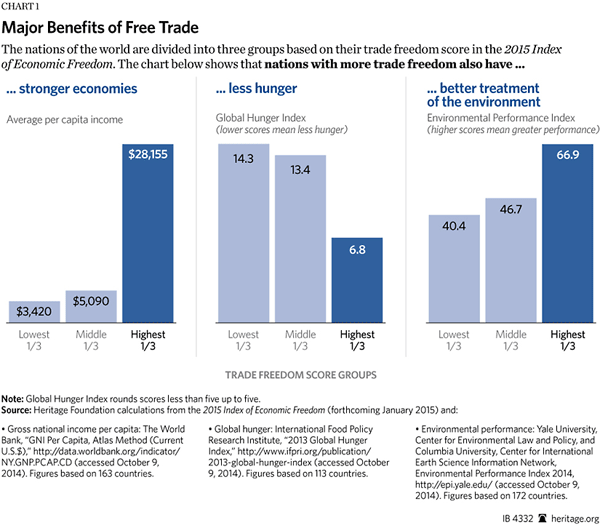What is the Trans-Pacific Partnership?
Five years in the making, the Trans-Pacific Partnership (TPP) is a trade agreement between the United States, Australia, Canada, Japan, Malaysia, Mexico, Peru, Vietnam, Chile, Brunei, Singapore, and New Zealand. The twelve countries in this agreement comprise roughly 40 percent of global G.D.P. and one-third of world trade.
The purpose of the agreement, according to the Office of the U.S. Trade Representative, is to “enhance trade and investment among the TPP partner countries, promote innovation, economic growth and development, and support the creation and retention of jobs.” The agreement could create a new single market for goods and services between these countries, similar to what exists between European countries.
What exactly is a trade agreement?
A trade agreement is a treaty between two or more countries that reduces or eliminates barriers to free trade, such as taxes, tariffs, quotas, or trade restrictions. Three of the most common types of trade agreements the U.S. is involved with are Free Trade Agreements (FTAs), Trade and Investment Framework Agreement (TIFAs), and Bilateral Investment Treaties (BITs).
The United States has FTAs in effect with 20 countries. These tend to be expansions or additions to other agreements, such as World Trade Organization (WTO) agreement. TIFAs provide frameworks for governments to discuss and resolve trade and investment issues at an early stage while BITs help protect private investment, develop market-oriented policies in partner countries, and promote U.S. exports.
Which goods and services are affected?
Almost everything. Tariffs will be immediately eliminated or reduced on nearly all agricultural products, industrial goods, and most textiles and clothing.
TPP will also provide mutual recognition of many regulations, including an exclusivity period for biologic drugs, which are derived from living organisms, and patent protection for pharmaceuticals.
What are the arguments in favor of TPP?
Some of the benefits outlined by the Obama administration are:
By eliminating over 18,000 taxes—in the form of tariffs—that various countries put on Made-in-America products, TPP makes sure our farmers, ranchers, manufacturers, and small businesses can compete—and win—in some of the fastest-growing markets in the world. With more than 95 percent of the world’s consumers living outside our borders, TPP will significantly expand the export of Made-in-America goods and services and support American jobs.
Free trade also tends to increase economic growth, reduces global poverty and hunger, and leads to better treatment of the environment.
Free trade also has national security implications. As Nobel-winning economist Thomas Schelling said, “Trade policy can be civilized or disorderly, US trade policies can antagonize governments, generate resentment in populations, hurt economies, influence the tenure of governments, even provoke hostilities . . . Trade is what most of international relations are about. For that reason trade policy is national security policy.”
What are the arguments against TPP?
The main opposition to the agreement comes from the political left. For example, labor organizations such as the AFL-CIO argue that it will lead to additional outsourcing of U.S. jobs. Communications Workers of America President Chris Shelton called the pact “a bad deal for working families and communities.”
Some large corporation also oppose the treaty. According to Bloomberg Business, Ford Motor Co. told Congress not to approve the agreement because it “fails to adequately address currency manipulation overseas, which may tip the playing field.”
What happens next?
In June President Obama asked Congress for—and received—“fast-track”, or trade promotion authority. Fast track allows the President to send trade deals to Congress for up-or-down votes. The Senate will not be able to amend or filibuster the treaty.
One of the conditions of this approval is that the President must publish the text of the agreement on the website of the Office of the United States Trade Representative for 60 days.
Before the agreement can take effect a majority of Congress must also implement legislation to bring U.S. laws into compliance with the TPP agreement.
Will Congress approve TPP?
It’s too soon to tell. Although this is a legacy-making issue for President Obama, many in his own party are vehemently opposed to the deal.
Why should Christians care about TPP?
Even if the political left is right about the effect on labor within the U.S., these types of trade agreements tend to benefit our poorest neighbors across the globe. As Walter Russell Mead says,
These deals allow desperately poor people in other countries to escape lives of rural poverty, tenant farming, or utter urban destitution for factory jobs. And however poorly paid these jobs may initially be, and however polluting and dangerous the factories may be, they do give the global poor a chance to get a foot on the bottom rung of the economic ladder.


